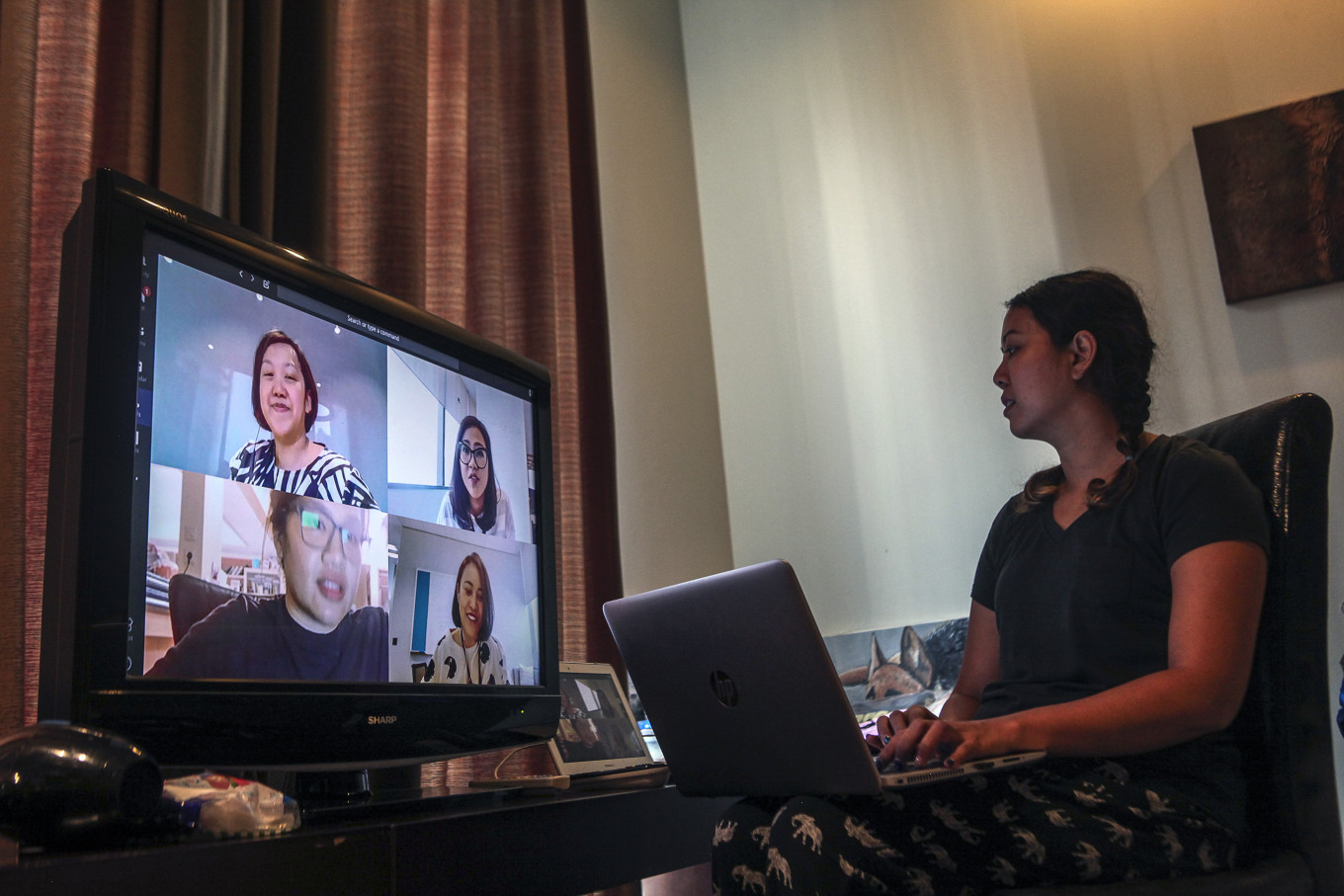Popular Reads
Top Results
Can't find what you're looking for?
View all search resultsPopular Reads
Top Results
Can't find what you're looking for?
View all search resultsCOVID-19: The psychological risks of quarantine and how you can cope
Self-quarantine might help "flatten the curve" of COVID-19 infection, but it has psychological consequences.
Change text size
Gift Premium Articles
to Anyone
 A Lawyer holds a teleconference with her colleagues in Jakarta on March 16. The usually bustling city of Jakarta may seem less busy in the next few days as several major companies are instructing staff to work from home over concerns about the spread of COVID-19. - JP/Seto Wardhana/vja/20 (JP/Seto Wardhana)
A Lawyer holds a teleconference with her colleagues in Jakarta on March 16. The usually bustling city of Jakarta may seem less busy in the next few days as several major companies are instructing staff to work from home over concerns about the spread of COVID-19. - JP/Seto Wardhana/vja/20 (JP/Seto Wardhana)
A
s if the pandemic wasn't bad enough – now we also have to deal with loneliness while being stuck inside. Could it get any worse?
Unfortunately, yes.
The COVID-19 pandemic has led people to engage in social distancing as a critical way to help “flatten the curve”. Strategies such as self-quarantine and social distancing are deemed by medical experts as necessary in reducing the spread of the virus. The problem is so many people overlooked the implications of those strategies for people’s mental wellbeing.
Three key elements of mental health are affected by the quarantine: autonomy, competency and connectedness. The evidence links social isolation with adverse health consequences, including depression, poor sleep quality, impaired executive function, accelerated cognitive decline, poor cardiovascular function and impaired immunity at every stage of life.
The interesting part is that a study found that the leukocytes of lonely participants showed an increased expression of genes involved in inflammation and a decreased expression of genes involved in antiviral responses. Loneliness, it seems, can lead to long-term "fight-or-flight" stress signaling, thus having a negative effect on our immune system.
Studies surveying those who had been quarantined reports of emotional disturbance, depression, stress, low mood, irritability, insomnia, post-traumatic stress symptoms, anger and emotional exhaustion. Low mood and irritability stand out as having high prevalence. Some evidence reported of longer term effects of quarantine, including alcohol abuse, dependency symptoms, and avoidance behaviors, and for some, the return to normality was delayed by many months.
The breakdown of the stressors is needed to come up with solution. The stressors during the quarantine include duration of quarantine, fears of infection, frustration and boredom, inadequate supplies and inadequate information. The stressors post quarantine includes finances and stigma. The next thing to do is to divide them into two categories: Those we can control and those we can’t.
Now, stop worrying about those stressors you can’t control and fix your focus on the stressors you can control.
1. The duration of quarantine
Chances are, if you are not a member of authority, you will not have the capacity to restrict the length of quarantine. So the most you can do is to adhere to your state’s social distancing guidelines. Why? Because the more people adhere to the scientifically proven strategy to combat the pandemic the faster we can rise from this outbreak.
Altruism is better than compulsion. The problem of adherence can be tackled if only people understand by being reinforced by the idea that quarantine is helping to keep others safe including those particularly vulnerable (such as those who are very young, old, or with preexisting serious medical conditions), and that health authorities are genuinely grateful to them. Feeling that others will benefit from one’s situation can make stressful situations easier to bear.
Make it a habit to always double-check the citation for each information. The sense of panic combined with the wanting to help might lead us to overshare some information.
Limit yourself from sharing unofficial information to avoid sharing hoaxes or misinformation that might add to the panic.
2. Frustration and boredom
Getting things done can provide a sense of purpose and competency. Search for tips and tricks of fighting the boredom during the quarantine. Communication is the key. There are three main parties you need to stay in contact with in the face of pandemic: loved ones and friends, public health officials and authorities. We should be grateful for living in 2020, when we can video call our loved ones and friends, have social media, official websites and can even get the food we want delivered. A phone line or online service specifically set up for those in quarantine and staffed by health-care workers who can provide instructions about what to do in the event of developing illness symptoms has also been provided.
The pandemic is also a game changer for application based mental health care. You can try downloading Headspace or Sanvello for meditation and wellness helper or Talkspace for teleteraphy platform.
3. Inadequate supplies, finances and stigma
These three are possibly the stressor we can hardly control. The best way to contribute as a solution for inadequate supplies is to not panic buying stuff and filtering false information about the necessity in the time of pandemic (like the viral panic buying of mask and alcohol swab). The problems with finances and stigma are more on the hand of authority; the best way to contribute on the finance problem is through various donations and for the latter, education is the key (including self-education).
The pandemic is indeed everyone’s nightmare and quarantine doesn’t make us feel any better, but it does make the pandemic control better. In times like this, the best thing to do is to trust the experts’ decision and make the most of it; that includes staying productive, maintaining communication, and filtering information.
***
The writer is a medical student at Airlangga University. This article was previously published on Medium.









